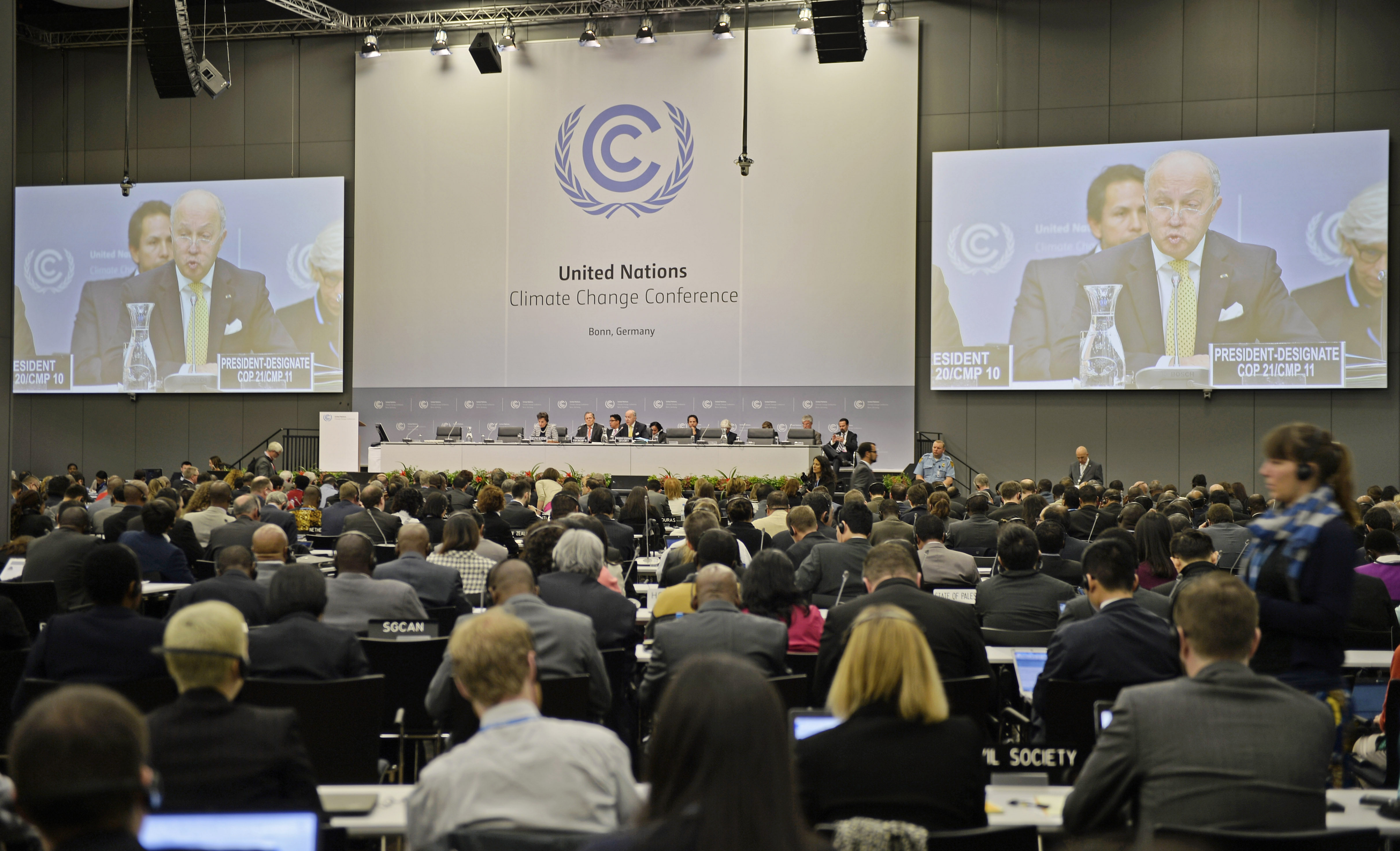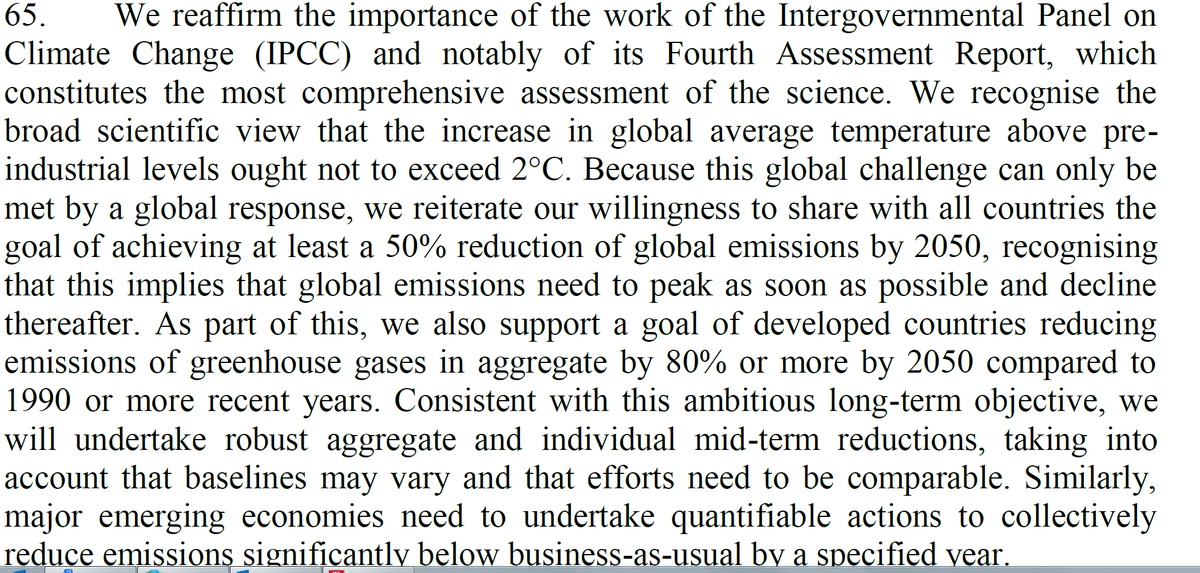GWPF | 9 June 2015
G7 Leaders Shift Decarbonisation Goal To End Of Century

Calls by the Group of Seven (G7) Monday to slash world carbon emissions did little to boost UN climate talks in Bonn, where frustration mounted over the snail-like progress. Due to end on Friday, the 11day Bonn talks are tasked with shaping a draft text for the November 30 December 11 UN conference in Paris, which must yield a global agreement. But after a week of wrangling, just about five percent had been shaved off a sprawling near 90 page draft, mostly by removing glaring duplications, said delegates. —Agence France-Press, 9 June 2015
1) Reality Check: UN Climate Talks Stall Despite G7 Posturing – Agence France-Press, 9 June 2015
2) Delayed Until Further Notice: G7 Leaders Shift Decarbonisation Goal To End Of Century – Slate, 8 June 2015
3) G7 Business As Usual: Plus Ça Change, plus C’est La même Chose – Oliver Geden, 8 June 2015
4) Exploiting Shale Gas & Oil Is A ‘Moral Obligation’, Says British Trade Union – BusinessGreen, 9 June 2015
5) Guess What? Europe Is Against Cheap Green Energy – Forbes, 7 June 2015
In a joint declaration from the G7 summit, leaders of the world’s richest countries called for a global phase-out of fossil fuels for the first time on Monday. That sounds great, but unfortunately, they’re talking about a lax timescale — “over the course of this century.” The leaders also committed to “doing our part to achieve a low-carbon global economy in the long-term,” though they didn’t announce any increased ambitions in cutting carbon in their own economies. –Eric Holthaus, Slate, 8 June 2015
Already in 2009 (L’Aquila summit), G8 made a similar announcement. How did it influence the Copenhagen climate summit? To sum up: G7 repeating UNFCCC + IPCC language and promising to go carbon neutral by 2099. —Oliver Geden, 8 June 2015
Trade union GMB has signed a landmark agreement with the fracking industry in a bid to accelerate the exploitation of shale gas and oil resources in the UK and boost local supply chains as the sector develops. In a move that is likely to anger environmental groups, GMB signed a joint charter with UK Oil and Gas (UKOOG) which argues that gas is “essential” to British industry and households and will continue to play a key role in the UK’s future energy mix. Gary Smith, GMB national secretary, said gas was a matter of national security. “Our homes and large parts of British industry need gas; any suggestion to the contrary is just not real world,” he said in a statement. —Jessica Shankleman, BusinessGreen, 9 June 2015
The lunatics have escaped their asylum and have taken over the entirety of this lovely and beauteous continent. They’re imposing import tariffs on cheap Chinese solar cells. This at the same time as vast swathes of public policy are devoted to the idea that we’ve got to have cheap renewable power in order to save our entire species from boiling itself. We’re also spending hundreds of billions to make such cheap renewables a reality. So, when someone comes knocking at the door asking if we’d like to purchase some cheap our answer is to try and tax them for their temerity? Seriously people, how did we end up with an entire continent, the cradle of modern civilisation, adopting such an insane public policy? –Tim Worstall, Forbes, 7 June 2015
1) Reality Check: UN Climate Talks Stall Despite G7 Posturing
Agence France-Press, 9 June 2015
Calls by the Group of Seven (G7) Monday to slash world carbon emissions did little to boost UN climate talks in Bonn, where frustration mounted over the snail-like progress.

“We are very concerned about the pace of negotiations,” said Amjad Abdulla of the Maldives, speaking for the Alliance of Small Island States (AOSIS) which are deeply exposed to climate change.
“We have not made the big jump forward that we need,” he told a stocktaking session. “There is clearly an urgent need to make more substantive progress and to proceed at a faster pace than we did last week,” said South Africa’s Nozipho Mxakatoc Diseko on behalf of the so called G77 and China group of developing nations.
Due to end on Friday, the 11day Bonn talks are tasked with shaping a draft text for the November 30 December 11 UN conference in Paris, which must yield a global agreement.
The final document is supposed to enshrine the will of 195 countries to roll back climate change, spell out commitments to tackle greenhouse gases and provide aid to vulnerable economies from 2020.
But after a week of wrangling, just about five percent had been shaved off a sprawling near 90 page draft, mostly by removing glaring duplications, said delegates. And there has been little serious talk about some of the many thorny issues that remain.
2) Delayed Until Further Notice: G7 Leaders Shift Decarbonisation Goal To End Of Century
Slate, 8 June 2015
Eric Holthaus
In a joint declaration from the G7 summit, leaders of the world’s richest countries called for a global phase-out of fossil fuels for the first time on Monday. That sounds great, but unfortunately, they’re talking about a lax timescale—“over the course of this century.”

The leaders also committed to “doing our part to achieve a low-carbon global economy in the long-term,” though they didn’t announce any increased ambitions in cutting carbon in their own economies. Reports from the two-day meeting in Germany indicated that bolder statements were considered, including a call to decarbonize the G7 economies by 2050, but they were ultimately dropped, likely under pressure from Canada and Japan.
Though today’s statement is bold, the focus on the very long-term is disappointing. The G7 meeting was billed as a showcase for Germany’s chancellor, Angela Merkel, to assert leadership on climate change in advance of key negotiations in December, when world leaders will gather in Paris and are expected to sign the first-ever global agreement on climate change. Expectations for an ambitious outcome in Paris have been waning in recent months, and today’s G7 statement doesn’t help things much.
3) G7 Business As Usual: Plus Ça Change, plus C’est La même Chose
Oliver Geden, 8 June 2015
German policy wonk Oliver Geden sums up the lame G7 climate statement in two tweets.
Oliver Geden @Oliver_Geden
Already in 2009 (L’Aquila summit), #G8 made similar announcement. How did it influence Copenhagen #climate summit?
Oliver Geden @Oliver_Geden
to sum up: #G7 repeating #UNFCCC + #IPCC language and promising to go carbon neutral by 2099
https://www.g7germany.de/Content/DE/_Anlagen/G8_G20/2015-06-08-g7-abschluss-eng.pdf?__blob=publicationFile&v=5 …

4) Exploiting Shale Gas & Oil Is A ‘Moral Obligation’, Says British Trade Union
BusinessGreen, 9 June 2015
Jessica Shankleman
Trade union GMB has signed a landmark agreement with the fracking industry in a bid to accelerate the exploitation of shale gas and oil resources in the UK and boost local supply chains as the sector develops.
In a move that is likely to anger environmental groups, GMB signed a joint charter with UK Oil and Gas (UKOOG) which argues that gas is “essential” to British industry and households and will continue to play a key role in the UK’s future energy mix.
A debate held by GMB on Monday considered whether it was “a moral duty” for Britain to exploit its shale gas resources if it has a plentiful supply, instead of importing gas from other countries which have lower safety or environmental standards.
The joint charter commits the two organisations to developing an industry safety forum to ensure strong regulation for the sector and maximise the creation of skilled jobs and local community benefits. GMB will also have a seat on the Operation and Advisory Council of a new National College for Onshore Oil and Gas.
Gary Smith, GMB national secretary, said gas was a matter of national security. “Our homes and large parts of British industry need gas; any suggestion to the contrary is just not real world,” he said in a statement. “The truth is we are going to be using gas including shale gas for a long time to come.
“Given these facts we need to honestly consider the moral and environmental issues about transporting gas, including shale gas, across oceans and continents and being increasingly dependent on gas from countries with regulatory and environmental standards lower than ours.”
The GMB’s stance represents a boost to industry arguments that the sector can help to curb overall greenhouse gas emissions by replacing imported gas and coal.
5) Guess What? Europe Is Against Cheap Green Energy
Forbes, 7 June 2015
Tim Worstall
How did we end up with an entire continent, the cradle of modern civilisation, adopting such an insane public policy?

I mentioned earlier today that Europe’s trade policy on sugar appears to be a piece of monstrous idiocy. And yet now I find something even worse, evidence that the lunatics have escaped their asylum and have taken over the entirety of this lovely and beauteous continent. They’re imposing import tariffs on cheap Chinese solar cells. This at the same time as vast swathes of public policy are devoted to the idea that we’ve got to have cheap renewable power in order to save our entire species from boiling itself. We’re also spending hundreds of billions to make such cheap renewables a reality. So, when someone comes knocking at the door asking if we’d like to purchase some cheap our answer is to try and tax them for their temerity?
Seriously people, how did we end up with an entire continent, the cradle of modern civilisation, adopting such an insane public policy?
The news is here:
The European Union has applied sharp tariffs on Chinese solar-panel makers Canadian Solar, ReneSola and ET Solar, kicking the companies out of a pact with the Chinese industry that allowed them to export to Europe with minimal tariffs.The three companies were found to be in violation of the 2013 agreement that required the export of solar panels above a minimum price and abide by several other conditions.
We what? We’re insisting upon a minimum price at the risk of 70% import duties? Apparently so:
The move is part of a long-running battle between the Chinese solar panel industry and manufacturers in Europe and the U.S. Western producers say that the Chinese firms, fed by hefty Chinese government subsidies, have built up huge overcapacity and are dumping their surplus products into Western markets at unfairly low prices.
The commission also questioned the practice by Canadian Solar and ReneSola of selling solar cells to firms in non-EU countries for assembly into panels that are then sold to the EU. Because the EU tariffs only apply to panels coming from China, the practice, though not a direct violation of the agreement, allows the two firms’ solar cells to enter the 28-nation EU unrestricted by the agreement.
This is madness. Pure, unrestricted, no we’re not going to let you out of that straitjacket matey, lunacy. […]
So, here’s our man (or three companies) hawking cheap solar cells. And instead of welcoming them in, offering a cup of tea as we haggle over pricing, we’re taxing them to make sure they can’t sell us any of their nice, cheap, solar cells? It would be funny if it weren’t so depressing.
That the suspicion is that those cells are cheap because of Chinese government subsidy doesn’t change this point in the least. Everyone in this space is getting subsidy. If nothing else, from those feed in tariffs that I’m not so keen on. At which point we seem to have the Guardians of European Purity insisting that our subsidies are just fine but not your nasty foreign ones. Which is absurd of course: it’s obviously better for the living standards of Europeans that Chinese people get to subsidise their solar cells than that Europeans have to subsidise their own.



